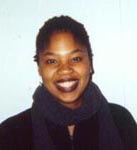Center for Instructional
Innovation and Assessment
INNOVATIVE TEACHING SHOWCASE
2002
2003
Institutional Goals
Listed below are selected learning outcomes in the area of critical thinking that Western Washington University is actively integrating into its curriculum. Each learning outcome is listed with its definition, along with a description of how Tara Perry's teaching strategies meet each of these student learning outcome goals.Critical Thinking
| Learning Outcomes | Definition | Course Outcomes |
|---|---|---|
| Identification | Accurately identifies and interprets evidence. | Students take what they learn from a workshop on service-learning and profile descriptions of service-learning agencies to select the agency that best matches their educational interests. |
| Alternative Consideration | Considers major alternative points of view. | Given a controversial issue faced by the community agency, students identify the position they support and then must develop a strong evidence-based argument for the opposing position. Each group presents their findings in a poster presentation. |
| Accurate Conclusions | Draws warranted, judicious, non-fallacious conclusions. | Students connect the reading materials to their practices in the community projects via progress reports, chapter discussions, exams, and final presentations. Students develop a sense of efficacy and confidence in their roles as subject matter experts for the class and with community agencies. |
| Justification | Justifies key results and procedures, and explains assumptions and reasons. | Students continually engage in written and verbal reflection on their service-learning experiences throughout the term. Students assess themselves as they gain knowledge and experience and make connections between theory and practice. Some of the life experiences they have in the community extend their learning beyond what is available in the text and in-class discussions. |
Source: Adapted from the California Academic Press's Holistic Critical Thinking Scoring Rubric (HCTSR).
Source: Adapted from Western Washington University's Learning Outcomes for Writing II.


